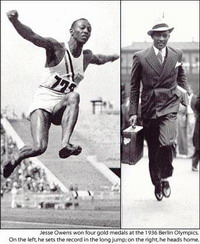Login form
Jesse Owens

At a college track meet in 1935, Jesse Owens set three world records and tied a fourth within the space of 45 minutes. His amazing performance that day was a sign of even greater things to come.
One year later, Owens became a hero of the Olympic Games. Competing as a member of the United States team, he won four gold medals. Today, Owens is remembered as one of the greatest track-and-field athletes of all time.
RURAL BEGINNINGS
James Cleveland Owens was born in 1913 in a small town in Alabama. His parents were farmers. In 1922, they left their rural life behind and moved to Cleveland, Ohio. When the teacher at his new school asked James his name, he told her his nickname, “J. C.” She thought he said “Jesse,” and that’s how he soon became known.
EARLY SUCCESS
Owens excelled at track and field in high school. By the time he graduated, 28 different colleges had offered him scholarships. Owens chose to attend nearby Ohio State University.
In May 1935, Owens competed in the Big Ten college track championships in Ann Arbor, Michigan. During the meet, he tied the world record for the 100-yard dash and set a new world record in the long jump that would last 25 years. Next, he set new world records in the 220-yard dash and the 220-yard low hurdles.
Owens success at Ann Arbor and other track-and-field meets led to even greater opportunities. Before long, he won a spot on the United States track team. In August 1936, Owens traveled to Berlin, Germany, to compete in the 1936 Summer Olympics.
OLYMPIC TRIUMPHS
In 1936, Germany was ruled by Adolf Hitler and his Nazi Party. Hitler believed that German people were superior to all others. He expected Germany’s athletes to dominate the Olympic Games. This would prove to the world that Germans were the best. Owens ruined Hitler’s plans.
Owens excelled in every event he entered. He won gold medals in the 100-meter sprint, the 200-meter sprint, and the long jump. Then he joined three U.S. teammates to take the gold in the 4 x 100-meter relay.
Owens was the only athlete to win four gold medals at the 1936 Summer Olympics. Despite Hitler’s disappointment, the German people cheered Owens wherever he went.
LIFE AFTER THE OLYMPICS
After his Olympic victories, Owens worked in community service, especially with young people. He spoke often about the importance of fair play and how success in sports can lead to success in other areas of life.
In 1979, President Jimmy Carter presented Owens with the Living Legend Award. At the award ceremony, Carter said Owens “has continued in his own dedicated but modest way to inspire others to reach for greatness.” Owens died in 1980.
Source: Microsoft ® Encarta

